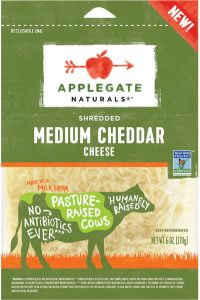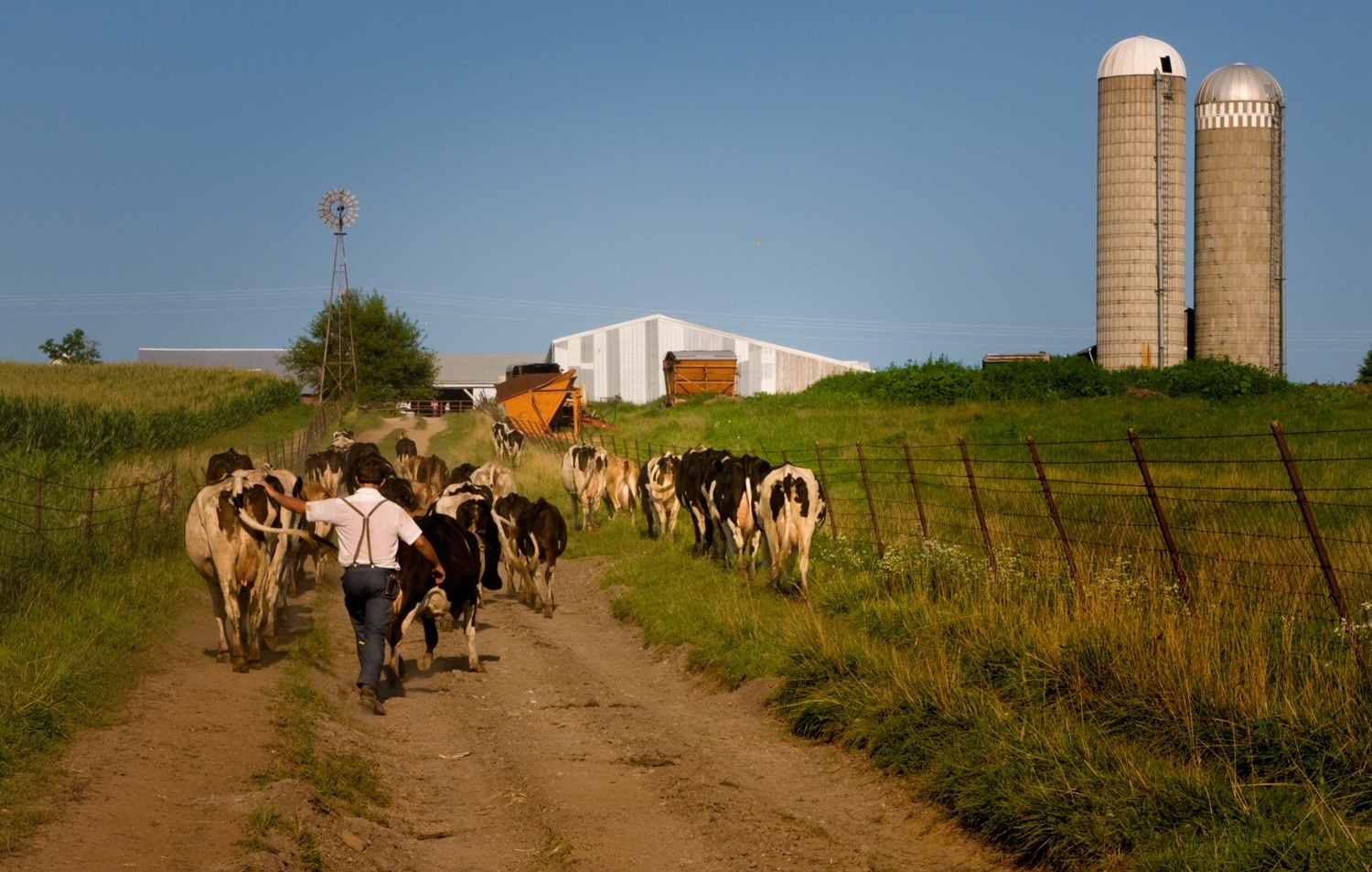The U.S. dairy market has been brutal for American dairy farmers with low milk prices and an oversupply of milk. Hundreds of dairy farms nationwide have closed. It has gotten so bad that, for the first time ever, the U.S. Department of Agriculture is using a 1935 law to buy $50 million worth of milk surpluses to support dairy farmers.
Fortunately, there is a ray of hope in a unique partnership to help small dairy farms. Applegate Farms, a manufacturer of natural and organic meat, is working with a network of Iowa dairy farmers to buy their milk at a premium price and process it into non-GMO verified cheese products. The partnership is helping to preserve Amish and Mennonite family dairy farms and support the community around them, while offering a model that could be replicated in other states.
“Wanted to have a unique story for our cheese”

Applegate Non-GMO Project cheese made from Kalona Organics milk
The idea for the partnership arose in 2016 when Gina Asoudegan, Applegate’s vice president of mission and innovation strategy, discussed ideas with Trent Hendricks, a consultant with Cabriejo, LLC.
According to Asoudegan, Applegate started producing cheese based on customer requests. “We’ve always been a meat company but as we built the business, our customers asked for cheese,” she says.
Initially, Applegate’s cheese production was almost an afterthought since the company mainly focused on its meat products, according to Asoudegan. But, she thought Applegate should provide the same transparency and supply chain information about their cheeses as they do for their meats.
“Consumers want to know more and more where their food is sourced from, and we wanted to have a unique story for our cheese,” she said.
This led her to contact Hendricks, who has experience developing supply chains, to learn about the dairy industry and explore developing a supply for Applegate’s cheese products. The challenge was to develop a personal story with dairy supply when the industry seemed impersonal.
“A lot of times the dairy industry is very invisible on the back end (farm level),” she said. “Milk is put into giant containers, and you can’t really take it back to an individual farm or network of farms, which we’ve always done on the meat side.”
Applegate wanted to work with similar, smaller farms as their meat producers, farms that have a personal story that connects with consumers.
“Saving farming communities”
Hendricks connected Asoudegan with Kalona Organics, a supplier of organic dairy products based in Kalona, Iowa. Kalona Organics buys milk from a network of more than 120 Amish and Mennonite dairy farmers and processes it into organic bottled milk, butter, yogurt, and other products.
As other dairy farmers nationwide, Kalona Organics’ farmers were facing challenges with an oversupply of organic milk, which sometimes forced them to sell their milk to conventional markets, often at a loss.
“We were trying to sell excess milk to other markets,” says Phil Forbes, supply chain director, Kalona Farms. “Trent asked if we would like to get involved with Applegate, supplying non-GMO milk for cheese. Our Kalona farmer fit their profile perfectly, an organic profile with an emphasis on small family farmers.”
The Kalona area has the highest concentration of organic farms in the U.S., according to Hendricks.
Asoudegan also saw a match with the Kalona farmers. “When we heard about Kalona, it seemed like a really interesting opportunity for us to change the supply chain for our cheeses and tie our product to something impactful at the farm level. We thought it could provide farmers with a premium and protect them from these market fluctuations.”
The farmers would have to meet Applegate’s production standards. These included cows raised in a pasture-based system, animal welfare standards, no use of antibiotics, and no genetically modified feed. The farms would also have to be Non-GMO Project Verified.
Because the Kalona farmers were certified organic, they were already meeting those standards. They only needed the non-GMO verification.
“It’s hard to find this profile of farmer. They are doing this based on their beliefs and culture,” Forbes says.
Applegate pays the farmers a premium price for their milk. The premium isn’t as high as they would get for organic milk, but for some farmers the premium was still 300 to 400 percent higher than the conventional milk price, according to Forbes. That premium has been a lifesaver in a time of small dairy farms going out of business.
“I tell Applegate they are literally saving farming communities and benefitting the greater community. It’s very helpful and seems to be a win-win so far,” Forbes says.
Unlike many small Iowa towns that have declined or even disappeared with the loss of small family farms, Kalona is thriving with a vibrant downtown, specialty shops, and upscale restaurants.
“Bill Evans (founder of Kalona Organics) said people in Kalona are proud that their town has two hardware stores,” Asoudegan says.
“Want to regenerate rural American landscape”
Applegate introduced its cheeses sourced from Kalona farms milk this past April. There are six sliced cheeses—Medium Cheddar, Provolone, American-style Colby, Muenster, Pepper Jack, and Mozzarella and three shredded cheese products. All are Non-GMO Project Verified.
Sales are good so far with new customers buying the product, says Asoudegan.
The cheeses are currently sold in Whole Foods, Publix, ShopRite, Sprouts, Meijer, and independent natural food stores.
The non-GMO cheeses give consumers another option in the marketplace, says Forbes.
“They’re an upgrade from conventional and not as expensive as organic so they attract a certain customer who would look at the non-GMO certification and say ‘That’s enough. I know what non-GMO means and I like this.’”
Hendricks adds: “There’s a lot of integrity in the products. The consumer really wins, and the famers win too.”
Another benefit is that the program provides a viable way for conventional farmers to transition to organic.
“The Kalona system can help transitioning farmers,” Asoudegan says. “They can move into non-GMO production and then into organic or grass-fed. It’s a trajectory for continuous improvement, and they can capture premiums along the way.”
There are efforts underway to expand the Applegate-Kalona partnership. A group of 56 conventional Amish farmers in Clark, Missouri will soon join the program. Forbes is also looking for similar communities of dairy farmers in other Midwestern states.
“We really see this as the beginning,” Asoudegan says. “We want to figure out ways to build on this with other products so we can further support the Kalona network.”
Ultimately, the Applegate-Kalona partnership is about helping family farmers and rebuilding rural communities.
“Food can be a catalyst for economic development. The more you build and preserve these small to mid-size farms and create economic viability for them, it has a ripple effect in the community,” Asoudegan says.
“It isn’t just the dairy system, it’s the community. We want to regenerate the rural American landscape,” Hendricks says.








